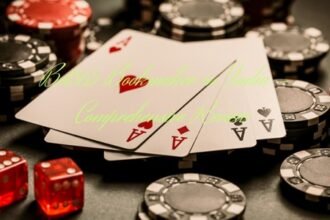Red Door Roulette is one of the latest internet trends that thrives on mystery, fear, and high-stakes decision-making. Participants allegedly enter a game where they must choose a door—each one leading to an unpredictable outcome, ranging from harmless to terrifying. Despite the obvious dangers, people continue to engage with it, either out of curiosity, thrill-seeking, or peer pressure.
The Thrill of Uncertainty and the Human Brain
The human brain is wired to seek out new experiences, even those that involve uncertainty and danger. This is primarily driven by the dopamine system, which plays a crucial role in reward-seeking behavior.
Why Uncertainty is Addictive
- Dopamine Activation – The brain releases dopamine when faced with unpredictable rewards, making risk-taking feel exhilarating.
- Curiosity Bias – The unknown is psychologically irresistible because it holds the potential for both excitement and discovery.
- Risk-Reward Evaluation – The prefrontal cortex evaluates whether the risk is worth taking, but emotions often override logic in high-adrenaline situations.
Comparison with Other Risk-Based Behaviors
| Behavior | Reason for Engagement | Psychological Impact |
| Gambling | Potential for big reward | Dopamine-driven addiction |
| Extreme Sports | Adrenaline and skill mastery | Thrill-seeking personality |
| Horror Games | Controlled fear experience | Heightened excitement |
| Red Door Roulette | Fear and mystery | Dopamine + anxiety rush |
The uncertainty factor in Red Door Roulette makes it highly compelling, especially for individuals who actively seek out unpredictable experiences.
The Allure of Fear: The Adrenaline Factor
Fear triggers a biochemical response that some individuals find intensely satisfying. This reaction is linked to the fight-or-flight mechanism, which is designed to prepare the body for danger but also contributes to thrill-seeking behaviors.
Physiological Reactions to Fear
- Adrenaline Surge – Increases heart rate, sharpens focus, and intensifies sensations.
- Cortisol Release – Heightens alertness but can also lead to stress if prolonged.
- Endorphin Rush – The body compensates for fear by releasing feel-good chemicals, creating a fear-pleasure loop.
Why Some People Enjoy Fear
- Desensitization – Regular exposure to fear (horror movies, haunted houses) lowers fear response, making extreme activities more appealing.
- Control Over Fear – Voluntary engagement in fear-inducing activities allows individuals to experience terror in a controlled environment.
- Peer Recognition – Successfully enduring fear often boosts social status within certain groups.
The adrenaline factor is a primary motivator for those drawn to high-risk challenges. The sharper the fear response, the more intense the experience, making activities like Red Door Roulette psychologically rewarding despite their dangers.
Social Influence and Peer Pressure
Risky behaviors are often amplified by social dynamics, particularly when people feel pressured to conform or prove themselves. Group psychology plays a major role in the popularity of Red Door Roulette.
Key Social Drivers Behind Risk-Taking
- Fear of Missing Out (FOMO) – Seeing others participate creates an urgency to join in, especially in online spaces.
- Social Validation – The need for recognition, likes, and comments pushes individuals to engage in extreme actions.
- Authority of Trends – If an activity is perceived as “popular” or “dangerous,” participation can be seen as a status symbol.
- Competitive Mindset – Some individuals feel the need to prove themselves by going further than others in risky activities.
The Role of Social Media in Amplifying Risky Behavior
| Factor | How It Contributes to Red Door Roulette’s Popularity |
| Viral Challenges | Creates a trend that encourages mass participation |
| Video Evidence | Sharing experiences reinforces the game’s mystique |
| Anonymous Forums | Lowers perceived risk, increasing participation |
| Competitive Streak | Encourages one-upmanship among participants |
The more a challenge is shared and glorified, the more likely it is that others will attempt it, regardless of the risks involved.
The Illusion of Control and Superstitions
Many people who engage in high-risk activities like Red Door Roulette believe they have some degree of control over the outcome. This illusion of control plays a significant role in risk-taking behavior, despite the inherent unpredictability of the game.
Cognitive Biases That Create the Illusion of Control
- Pattern Recognition – The brain attempts to find patterns in random events, leading participants to believe they can predict or influence outcomes.
- Confirmation Bias – Players remember “successful” choices and ignore failures, reinforcing the belief that they can manipulate the game.
- Overconfidence Effect – Some individuals overestimate their ability to handle high-risk situations, making them more likely to participate.
Superstition and the Paranormal Factor
- The mystique of the unknown often fuels participation, with many believing in supernatural elements.
- Ritualistic behaviors, such as specific phrases or actions before opening a door, create a false sense of security.
- Fear-driven superstition makes the experience more psychologically immersive, heightening emotions and reinforcing the belief in its authenticity.
The illusion of control combined with superstitious thinking increases engagement by making participants feel as though they have agency over an unpredictable game.
Psychological Archetypes: Who Plays Red Door Roulette?
Not everyone is equally likely to engage in Red Door Roulette. Specific psychological traits and personality types make individuals more susceptible to taking risks in high-stakes, fear-driven scenarios.
Main Personality Types Involved
| Archetype | Characteristics | Why They Participate |
| Thrill-Seekers | Adrenaline junkies, high dopamine response | Crave excitement and high-risk experiences |
| Curious Explorers | Naturally drawn to the unknown | Engage out of intellectual curiosity |
| Reckless Daredevils | Impulsive, disregard consequences | Test limits and push boundaries |
| Social Conformists | Easily influenced by peer pressure | Join because of group dynamics or FOMO |
Each of these groups is driven by different motivations, but all share a willingness to engage in uncertain, high-stress environments.
Consequences: The Mental and Emotional Aftermath
The psychological effects of Red Door Roulette extend beyond the initial experience. While some may walk away unaffected, others experience serious mental and emotional repercussions.
Short-Term Psychological Effects
- Increased Anxiety – The anticipation and fear generated by the game can trigger lingering nervousness and hypervigilance.
- Sleep Disturbances – Many participants report insomnia, nightmares, and paranoia after playing.
- Stress Response Overload – The brain struggles to return to a normal baseline state, leading to prolonged tension.
Long-Term Psychological Consequences
| Effect | Description |
| Paranoia | Fear that the game has real-world consequences |
| PTSD-Like Symptoms | Flashbacks, avoidance behavior, persistent distress |
| Desensitization to Risk | Increased willingness to engage in further dangerous activities |
While some individuals may find the experience exhilarating, others suffer lasting psychological distress, particularly if they believe in the supernatural consequences of the game.
Conclusion
Red Door Roulette is not just a viral phenomenon—it is a psychological experiment in risk-taking, fear, and social influence. The decision to participate is driven by a complex interplay of dopamine-fueled curiosity, the adrenaline rush of fear, peer dynamics, and cognitive biases.
Key Takeaways
- The brain craves uncertainty and risk, making Red Door Roulette psychologically addictive.
- Adrenaline and social validation amplify the thrill of the game.
- The illusion of control and superstition make participants believe they have influence over the outcome.
- Different psychological archetypes are drawn to the game for various reasons, from thrill-seeking to peer pressure.
- The mental aftermath can range from temporary anxiety to long-term psychological distress.
Understanding the psychological mechanisms behind risky behavior is crucial to recognizing when curiosity turns into dangerous decision-making. While some may dismiss Red Door Roulette as an internet myth, the psychological impact on participants is real and should not be underestimated.







